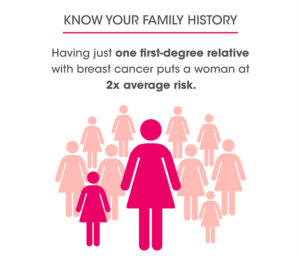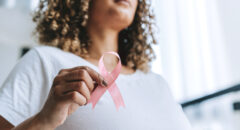
Health history is likely not something you think about on a regular basis. You might consider it once a year when visiting a healthcare provider. You flip through the required pre-appointment paperwork, answer what you can, the information gets filed away, and you go on with your routine visit. But our family’s health history can be a key indicator of our own health risks.
If we have breast cancer in our family, especially in a mother, sister, or grandmother, we can’t let this critical piece of information get lost in our patient files. That knowledge can be incredibly powerful in determining our own breast cancer risk. And as black women, we’re facing a greater risk of mortality from breast cancer than white women. Prevention is paramount and has the power to change those odds.
The State of Breast Cancer in Black Women
The rates of black women diagnosed with breast cancer are comparable to other races, and yet women are disproportionately dying of the disease despite its generally high survivability (when detected early, the 5-year survival rate for breast cancer can be greater than 98%).
Between 2010 and 2014, black women were dying of breast cancer at a rate 43% greater than white women. In Memphis, the odds of black women dying of breast cancer are double that of white women. In Chicago, recent strides have been made to reduce the gap from 62% to 39%, but the significant disparity still remains.
There are many reasons for these disparities, some of which are beyond our control. But by understanding the issue and our own personal risk, we can be empowered to manage our breast health proactively.
A Family Matter
1 in 8 women, or 12% of women in the country, will be diagnosed with breast cancer. However, if you have a first-degree relative (a mother, a sister, or a grandmother) who was diagnosed with breast cancer, your personal risk automatically doubles.
It becomes even greater if that family risk is coming from a genetic mutation, meaning a fault in one of the genes in your body charged with protecting you from cancer. While rates of genetic mutations are relatively low, black women are more likely to have a BRCA2 mutation, which can increase your risk of getting breast cancer to up to 84%.
That’s why it’s so important to ask your family questions about their medical history. It can be difficult (sometimes impossible) and uncomfortable, but ifyou have the opportunity you should take it. The most important questions to ask are:
- Who in our family has been diagnosed with cancer?
- What type of cancer were they diagnosed with?
- What age were they diagnosed with cancer?
The question about age is especially important. Black women specifically are more likely to be diagnosed with basal-like breast cancer, an aggressive type of breast cancer that makes up one-third of all diagnoses for black women under age 50. Black women are also more likely to be diagnosed with triple negative breast cancer. The higher incidence of these cancers has been found in both African American women and women of African descent. Both of these cancers don’t respond to the most common treatments, which makes early detection and awareness so important.
If your family’s cancer history meets certain criteria, you may want to consider talking to a genetic counselor about genetic testing to determine whether that history is the result of a genetic mutation and whether you’ve inherited that mutation. While carrying a genetic mutation greatly increases your own personal risk, this knowledge can offer you the powerful opportunity to proactively manage your risk. Furthermore, the Genetic Information Nondiscrimination Act (GINA) protects women with genetic mutations from facing discrimination when seeking health insurance or employment.
What You Can Do Today
This is heavy stuff - but tackling this issue for yourself and for your family can help you all live healthier happier longer lives. And you’re not alone in this endeavor towards personalized prevention. Bright Pink®, a national breast, and ovarian health organization has a tool to help you better understand and manage your risk. The Assess Your Risk™ interactive quiz features questions about your health history and lifestyle, and with each question, you have the opportunity to learn how each factor contributes to your personal risk. If you don’t have your family history at your fingertips, you can use the “Help Me Ask Them” button to easily email the question to a loved one.
When you’re done with the quiz, email your results directly to your healthcare provider or print and bring to your next appointment. This information can give you the knowledge to help develop habits that will allow you to detect cancer at early, non-life-threatening stages. You have the power to be proactive.
One in eight women will be diagnosed with breast cancer in their lifetime. Two-thirds of women that are diagnosed with ovarian cancer will die as a result of their diagnosis. However, if a woman is aware of her risk level, she has up to an 85% chance of reducing that risk. At Bright Pink, we embrace this reality and believe that by putting Awareness in Action™, women can be set on a path to better breast and ovarian health. Since Bright Pink’s inception, we have reached over 20 million women with our message. To learn more about your personal risk, visit AssessYourRisk.org.









